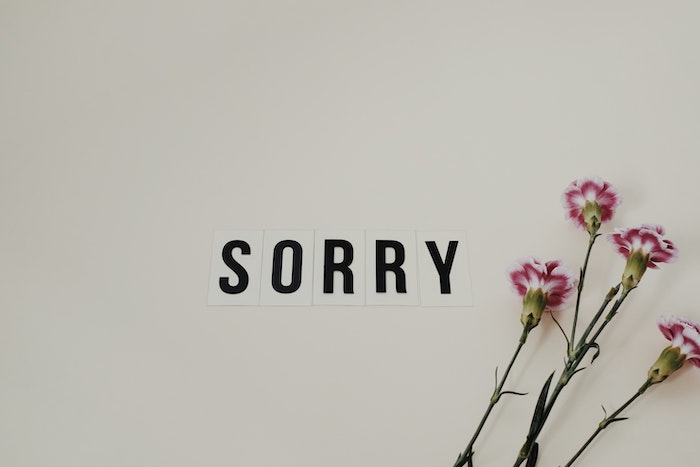LIFE
Tough Stuff
How to know when to apologize (bc you don't need to be sorry for everything)

This essay reflects the thoughts and opinions of the author.
If you're anything like me, "sorry," is probably a word at the forefront of your vocab. Missed a shot for you and your doubles partner while playing tennis? Got a bad score on a math test and felt like you disappointed your parents? Felt like you were in the way when someone *else* walked into you? You'd most likely apologize profusely.
I recently realized that this is a habit I needed to quit—and this is your sign to do it too. You're probably wondering: "But wait...isn't apologizing a good thing? Doesn't it make you a nice person?"
And you're right: saying you're sorry (when you genuinely are) can be imperative to maintaining healthy relationships. But the problem lies within over-apologizing for things that aren't even your fault. Apologizing for every little thing can lead to a cycle of self-blaming and self-deprecating thought patterns, ultimately lowering self-esteem.
And even more shocking? Research shows that women apologize more than men due to dated gender roles and expectations that women should be quiet and polite.
PSA: Women can be assertive. Women should not be sorry for taking up space. You deserve to be unapologetically confident in the decisions you make and who you are.
It's time to stop being sorry for everything. Wondering where to start? We've got you covered with how to know when to apologize and what to do instead when you shouldn't.
When you should apologize...
Before we go into when you *don't* need to apologize, we need to clear one thing up. If you ever hurt someone else's feelings (even if it wasn't intentional), apologizing might be the right thing to do. If your friend approaches you to tell you that they're upset by something you said or did, you shouldn't always be so quick to defend yourself. Reflect on your past actions and put yourself in their shoes. How would you feel if you were in their sitch? Our rule of thumb: If you'd be upset if you were them, (and if it feels genuine and right to do so), apologize. Tell them why you're sorry and promise them how you'll do better going forward.
When you shouldn't...
If it's something out of your control
We're here to let you know that you do *not* need to apologize for things that aren't your fault or are out of your control. You can't control the weather or how other people around you react to things, so you don't have to tell others you're sorry when something out of your control goes wrong.
For being yourself
Please, please know that you *never* have to apologize for taking up space or for speaking your mind. Always be yourself, whether you're loud and passionate or quiet and creative. In the words of Eleanor Roosevelt, nobody can make you feel inferior without your consent. And if someone tries to? Time to say "see ya!" and move on from them (bc you *sooo* don't have time for that negative energy).
Here's what to say instead:
If someone walks into you...
"Pardon me/Excuse me." (You deserve to take up space!)
If you make a mistake...
"Thank you for your patience." (Bc gratitude > guilt.)
If you have to turn someone (who expects something unreasonable of you) down...
Say. No. Bc you deserve to have boundaries for yourself.
If someone comments on your personality/appearance in a negative way...
I like myself just the way I am. And if you have a problem with that, that's on you.
You are amazing. Now go live your truth—unapologetically!
Loving the advice? Check out these related posts:
💖 How to have better boundaries
💖 The introvert's guide to surviving social gatherings
💖 How to get yourself out of a slump
How will you be kinder to yourself? Tell us on Twitter @girlslifemag!
All GIFs via GIPHY I Slider and top images via Pexels
POSTED IN LIFE, Tough Stuff

 become a contributor
become a contributor













.png)




